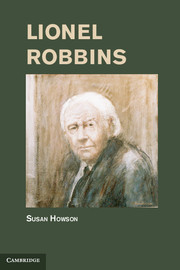Book contents
- Frontmatter
- Contents
- Illustrations
- Abbreviations
- Introduction
- One Father and Son
- Two The Great War
- Three Postwar
- Four The London School of Economics
- Five Iris Gardiner
- Six New College Oxford
- Seven The Young Professor
- Eight Fritz and Lionel
- Nine The School in the Mid-1930s
- Ten The Approach of War
- Eleven The Economics of War
- Twelve Director of the Economic Section
- Thirteen Anglo-American Conversations
- Fourteen The Law Mission and the Steering Committee
- Fifteen 1 9 4 4
- Sixteen The Last Months of the War
- Seventeen The Postwar Settlement
- Eighteen Return to the School
- Nineteen The End of the Transition
- Twenty LSE in the Early 1950s
- Twenty-One Chairman of the National Gallery
- Twenty-two Lord Robbins
- Twenty-three The Robbins Report
- Twenty-four The Sixties
- Twenty-five The Arts
- Twenty-six The Troubles at LSE
- Twenty-seven Retirement
- Conclusion
- Bibliography
- Index
Thirteen - Anglo-American Conversations
Published online by Cambridge University Press: 07 October 2011
- Frontmatter
- Contents
- Illustrations
- Abbreviations
- Introduction
- One Father and Son
- Two The Great War
- Three Postwar
- Four The London School of Economics
- Five Iris Gardiner
- Six New College Oxford
- Seven The Young Professor
- Eight Fritz and Lionel
- Nine The School in the Mid-1930s
- Ten The Approach of War
- Eleven The Economics of War
- Twelve Director of the Economic Section
- Thirteen Anglo-American Conversations
- Fourteen The Law Mission and the Steering Committee
- Fifteen 1 9 4 4
- Sixteen The Last Months of the War
- Seventeen The Postwar Settlement
- Eighteen Return to the School
- Nineteen The End of the Transition
- Twenty LSE in the Early 1950s
- Twenty-One Chairman of the National Gallery
- Twenty-two Lord Robbins
- Twenty-three The Robbins Report
- Twenty-four The Sixties
- Twenty-five The Arts
- Twenty-six The Troubles at LSE
- Twenty-seven Retirement
- Conclusion
- Bibliography
- Index
Summary
By the autumn of 1942 the ‘conversations’ called for in Article VII of the Mutual Aid Agreement had still not taken place. Several more months elapsed before they began in an informal way. In those months – the period of this chapter – much of Lionel’s work revolved around postwar planning: monetary policy, commodity policy, commercial policy, reparations and domestic employment policy. Progress was uneven.
On the international issues the UK government had invited the Dominions and India to official talks in London, which opened at the Treasury on Friday 23 October, the day General Sir Bernard Montgomery began the battle of El Alamein. Sir Richard Hopkins chairing the first meeting explained that they were an opportunity for the other governments’ representatives to consider the current British proposals for postwar international economic reconstruction (PET(42) 1st meeting, DO35/1014/7, TNA). These included Keynes’s plans for an International Clearing Union – which had been disclosed informally to the US Administration by the UK Treasury representative in Washington, Sir Frederick Phillips – and for International Regulation of Primary Products. Phillips chaired most of the meetings in London. According to Hume Wrong of the Canadian delegation, ‘The chief figures in these talks are Keynes (the main promoter of ideas and debate), Prof. Robertson of the Treasury, Prof. Robbins of the War Cabinet Secretariat, [Roland] Wilson of Australia, Sir Ramaswami Mudaliar and Sir Theodore Gregory for India, [Richard] Campbell for New Zealand’ and his own colleagues Louis Rasminsky and W.A. Mackintosh (Wrong diary, 26 October 1942, MG30/E101/4/23, LAC). After Keynes outlined his Clearing Union plan the delegates spent three meetings going through the plan paragraph by paragraph. They did the same with the commodity plan. Lionel made occasional contributions to the former discussion; he had more to say in the latter, answering many queries from the Dominions delegates, who had only just received a written version of the plan. He supported Keynes on several points, for instance over the management and financing of the buffer stocks; he also made drafting suggestions, especially to enable the plan to accommodate the differing needs of wealthier and poorer countries (PET(42) 2nd-8th meetings, 26–30 October and 2–3 November 1942, DO35/1014/7). After the talks Keynes revised both the Clearing Union and the commodity proposals, the latter drastically.
- Type
- Chapter
- Information
- Lionel Robbins , pp. 424 - 461Publisher: Cambridge University PressPrint publication year: 2011

